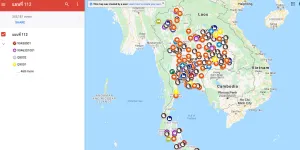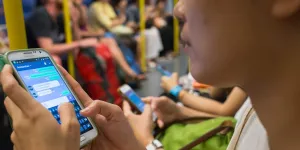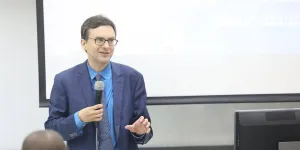By Prachatai |
<p>The online royalist group Thailand Help Centre for Cyberbullying Victims has reportedly threatened to file lèse majesté charges, or Section 112 of the Thai Criminal Code, against over 100 people, whose personal details were released on a Google map link.</p>
By Amnesty International |
<p>The Thai authorities are prosecuting social media users who criticize the government and monarchy in a systematic campaign to crush dissent which is being exacerbated by new COVID-19 restrictions, Amnesty International said in a new report released today.</p>
By Anna Lawattanatrakul |
<p>Prachatai English interviews Polish political scientist Rafał Pankowski, Associate Professor at the Collegium Civitas in Warsaw, head of the "Never Again" Association's East Europe Monitoring Centre, and Deputy Editor of Never Again's magazine about the rise of right-wing extremism in Central and Eastern Europe, its effects on the human rights situation, the role of social media, and the common challenges of our time.</p>
<div> </div>
<div>Despite the censorship and surveillance already imposed on the press and Internet users after the coup d’état in May, the junta is now exacerbating an environment of fear by further tightening its control over social media.
</div>
<div>
<div> </div>
<div>The Ministry of Information and Communication Technology (MICT) is proposing a plan to build a state-owned Facebook-like social networking site called Thailand Social Network. </div>
<div> </div>
<div>Surachai Srisarakam, MICT Permanent Secretary, said the Thailand Social Network is part of the Ministry’s plan to build the country’s digital infrastructure, called “Smart Thailand,” according to Matichon Online.
</div></div>
<div>
<div> </div>
<div>The Ministry of Information and Communication Technology (MICT) has blocked 219 websites which are deemed threats to “national security” according to an order of the military junta and it will ask Facebook, YouTube and Line, a chat application, to ban some user accounts which disseminate “illegal” content, Surachai Srisakam, Permanent Secretary of the MICT, told media on Tuesday. </div>
<div> </div>
<div>The MICT is also drafting a plan to build a national internet gateway so that censorship measures can be applied by the state more efficiently.
</div></div>
<div>The Facebook page of the National Peace and Order Maintenance Council (NPOMC) has been stormed by song requests from Thai Internet users who have been frustrated by Thai nationalist right-wing songs from WWI, WWII and the Cold War era, played repeatedly when all broadcast media were ordered to stop broadcasting. </div>
<div>
</div>
<div>
<div> </div>
<div>The National Peace and Order Maintenance Council (NPOMC), a special security body led by coup maker Army Chief Prayuth Chan-ocha, announced several orders early on Friday morning which aim at limiting the freedom of expression and information of Thai citizens.</div>
<div> </div>
<div>These measures were added after many TV channels and radio stations were forced to stop broadcasting their own programmes and only relay signals from the army’s TV and radio stations.
</div></div>
By Pravit Rojanaphruk, @PravitR |
<p itemprop="description">Since the Bangkok shutdown operation was launched by the anti-government People's Democratic Reform Committee (PDRC) in a desperate bid to oust the government, many people have taken to assessing the political situation on a daily basis - if not more often - and have kept a close watch on the latest words from PDRC secretary-general Suthep Thaugsuban, caretaker Prime Minister Yingluck Shinawatra and military top brass. In such a period of crisis, however, we also need to try harder to look at the bigger picture.</p>
<p></p>
By Mattawan Sutjaritthanarak |
<div>Thailand has surprised the world again with the abrupt violence during the political protests at the beginning of December 2013 as pro- and anti-government protesters confronted each other on the streets leading to 5 deaths.
</div>
By Takato Mitsunaga |
<p>Adults should listen to teenagers if they want to protect the privacy of the young when using social media, Professor Dr. Urs Gasser, Executive Director, Berkman Center for Internet and Society, Harvard University, said in his presentation on Youth, Social Media, and the Future of Privacy at Chulalongkorn University on July 4.</p>
<p></p>
By Harrison George |
<p>A 30-year-old resident of the US who was born in Bangladesh was beaten up in the Bronx on the day of the Boston Marathon bombings. A group of 3 or 4 men, described by the victim as Hispanic looking, had decided that the bombing was the work of Arabs. They then assumed that the Bangladeshi looked sufficiently Arab and ‘took revenge’. The Bangladeshi man hadn’t even seen the news at that point and had no idea why he was being attacked.</p>
<p></p>



